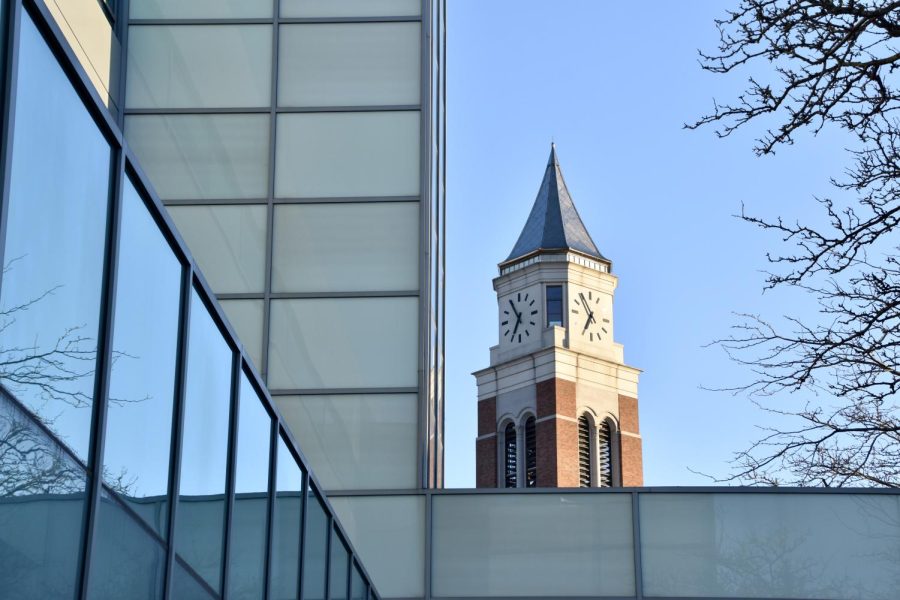Spanish Department retains most in-person classes despite lack of space
Since the return to in-person classes at Oakland University, the lack of classroom space has become more apparent. The Spanish Department in particular felt the impact of the space deficit, but faculty have since worked out a plan for the majority of classes to remain in-person for the Fall 2022 and Winter 2023 semesters.
Most of the Spanish classes are held at South Foundation Hall (SFH). However, the building closed on Feb. 1, 2021 in preparation for the $40 million renovation and expansion, which has since been delayed.
While the building’s closure was not expected to have a significant impact on campus operations initially due to classes and activities being remote, the delay and return to in-person proved otherwise. Administration said occupancy of SFH is expected by December 2023.
The lack of classroom space due to the closure was a challenge for planning classes for the upcoming semesters, and faculty and students alike were shaken by the possibility of a majority of classes going online.
“The initial situation, to put it clearly, it has affected everybody in the College of Arts and Sciences, and everybody has been creative to figure out a way to find classes,” Associate Professor Adolfo Campoy-Cubillo said.
The entire Department of Modern Languages was originally affected, but because Spanish is the largest program in the department, the program felt the greatest impact. However, the problem has since been alleviated as classroom space has been found for most courses.
“The 1000, 2000 [level courses] — hardly any of that was put online, so all of them [were] continuing to be on site and it affected more of the upper level courses, but we’ve been working very hard on that and we’ve been able to find room for most of them, so the initial situation looked like many of the advanced courses were going to have to be online — mainly for the fall, not so much in the winter — but we’ve been able to find room so it’s really not that big of a deal now,” Campoy-Cubillo said.
As of March, only four or fewer Spanish classes will potentially be online for the Fall 2022 semester. The shock, though, had concerned faculty and students because of the importance of face-to-face conversation when learning a language.
Student Rebecca Schwartz is a Spanish major who plans to become a professor. While she is a first year student, she is a junior by credits, so she currently takes upper level courses.
“I think that a foundation of education is having in-person and human interaction — I think that’s important,” Schwartz said. “For me, personally, I would prefer in-person classes, but with languages specifically, I think there’s an extra degree of difficulty when learning a language that you don’t naturally speak at home virtually … so much of it is based on that interaction and being able to hear someone else’s inflection or to read their social cues or to have a connection with someone to even feel comfortable speaking in front of them because it’s intimidating speaking a second language.”
Having seen classes fully online on MySail while planning for the upcoming semester, Schwartz decided to transfer from OU to the University of Illinois Chicago. While many classes have sinced changed to be in-person, some of the classes Schwartz must take will still be held online at OU, and she would prefer in-person classes for her major.
“A lot of uncertainty and there’s not a lot of prioritizing [of the Spanish Department at OU] and also too, it sometimes feels like there’s, not that there’s not a lot being done because I know there’s lots of professors who fight for the classrooms and fight to have the classes on schedule, but I feel like that in and of itself is a message as well. Why did the professors have to fight so hard and have to get to the point where they have to find classrooms? … I think that speaks volumes.”
Fourth-year Berenice Carrillo is a modified Spanish and health sciences major, whose goal is to become a dermatologist who can reach more people through being bilingual. Carrillo also prefers the interactivity in-person classes.
“You can only hear the teacher speak the language with whatever audio quality is being produced,” Carrillo said. “Most of the time, there is no opportunity to practice speaking the language. It is very rare for a student to speak at all, not from the lack of the professor trying to inspire conversation but from just not having that sense of community and feeling heard. Fun group activities are no longer possible. In break out rooms at least one person needs to be very extroverted for conversation to even start.”
Despite the obstacles, professors are adapting to the space changes. Meanwhile, they have also worked to lower the cost of textbooks to make the program more affordable and accessible for students, Campoy-Cubillo said.
“Everybody has had to figure out how to address this temporary situation, but we’re resilient here, right? We’ve been resilient with the pandemic and now we’ll be resilient during the construction,” Campoy-Cubillo said.






